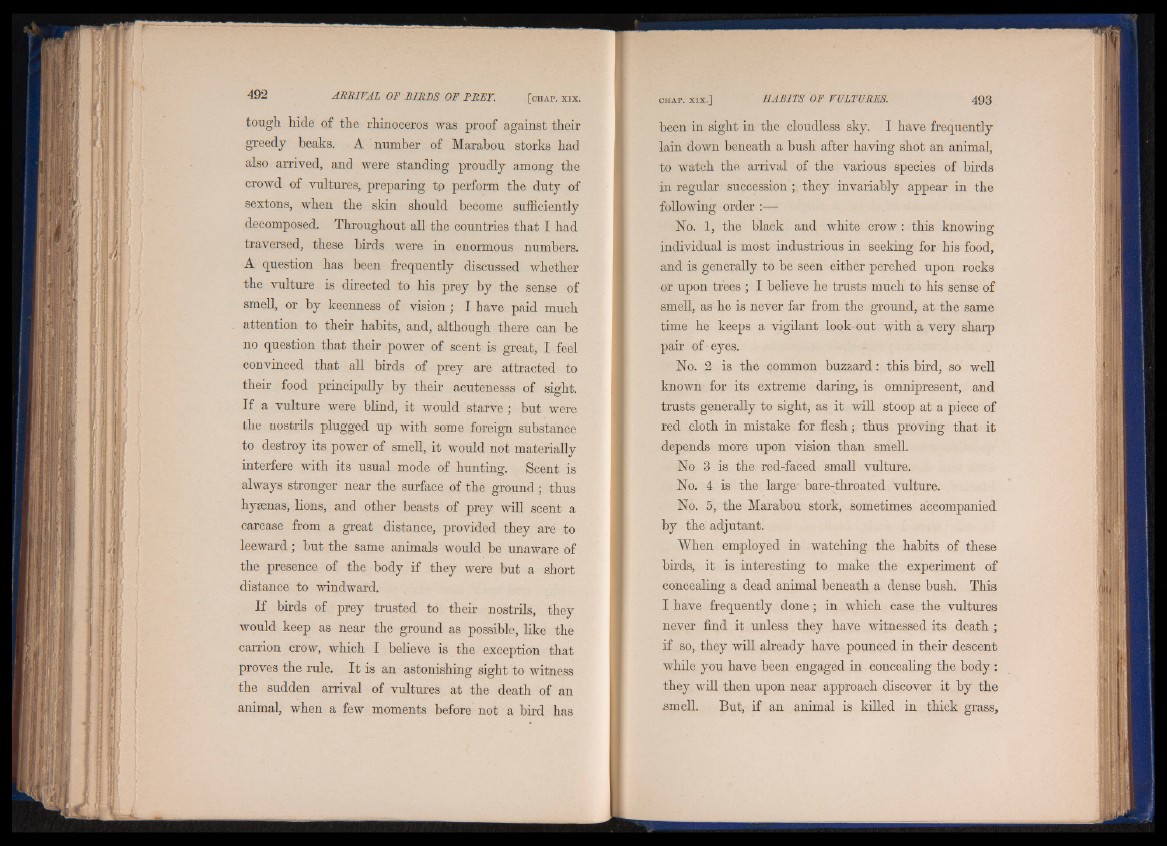
tough hide of the rhinoceros was proof against their
greedy beaks. A number of Marabou storks had
also arrived, and were standing proudly among the
crowd of vultures, preparing tp perform the duty of
sextons, when the skin should become sufficiently
decomposed. Throughout all the countries that I had
traversed, these birds were in enormous numbers.
A question has been frequently discussed whether
the vulture is directed to his prey by the sense of
smell, or by keenness of vision; I have paid much
attention to their habits, and, although there can be
no question that their power of scent is great, I feel
convinced that all birds of prey are attracted to
their food principally by their acutenesss of sight.
If a vulture were blind, it would starve; but were
the nostrils plugged up with some foreign substance
to destroy its power of smell, it would not materially
interfere with its usual mode of hunting. Scent is
always stronger near the surface of the ground ; thus
hyaenas, lions, and other beasts of prey will scent a
carcase from a great distance, provided they are to
leeward; but the same animals would be unaware of
the presence of the body if they were but a short
distance to windward.
If birds of prey trusted to their nostrils, they
would keep as near the ground as possible, like the
carrion crow, which I believe is the exception that
proves the rule. It is an astonishing sight to witness
the sudden arrival of vultures at the death of an
animal, when a few moments before not a bird has
been in sight in the cloudless sky. I have frequently
lain down beneath a bush after having shot an animal,
to watch the arrival of the various species of birds
in regular succession ; they invariably appear in the
following order :—-
No. 1, the black and white ' crow : this knowinog
individual is most industrious in seeking for his food,
and is generally to be seen either perched upon rocks
or upon trees ; I believe he trusts much to his sense of
smell, as he is never far from the ground, at the same
time he keeps a vigilant look out with a very sharp
pair of-eyes.
No. 2 is the common buzzard: this bird, so well
known for its extreme daring, is omnipresent, and
trusts generally to sight, as it will stoop at a piece of
red cloth in mistake for flesh; thus proving that it
depends more upon vision than smell.
No 3 is the red-faced small vulture.
No. 4 is the large- bare-throated vulture.
No. 5, the Marabou stork, sometimes accompanied
by the adjutant.
When employed in watching the habits of these
birds, it is interesting to make the experiment of
concealing a dead, animal beneath a dense bush. This
I have frequently done; in which case the vultures
never find it unless they have witnessed its death ;
if so, they will already have pounced in their descent
while you have been engaged in concealing the body :
they will then upon near approach discover it by the
smell. But, if an animal is killed in thick grass,